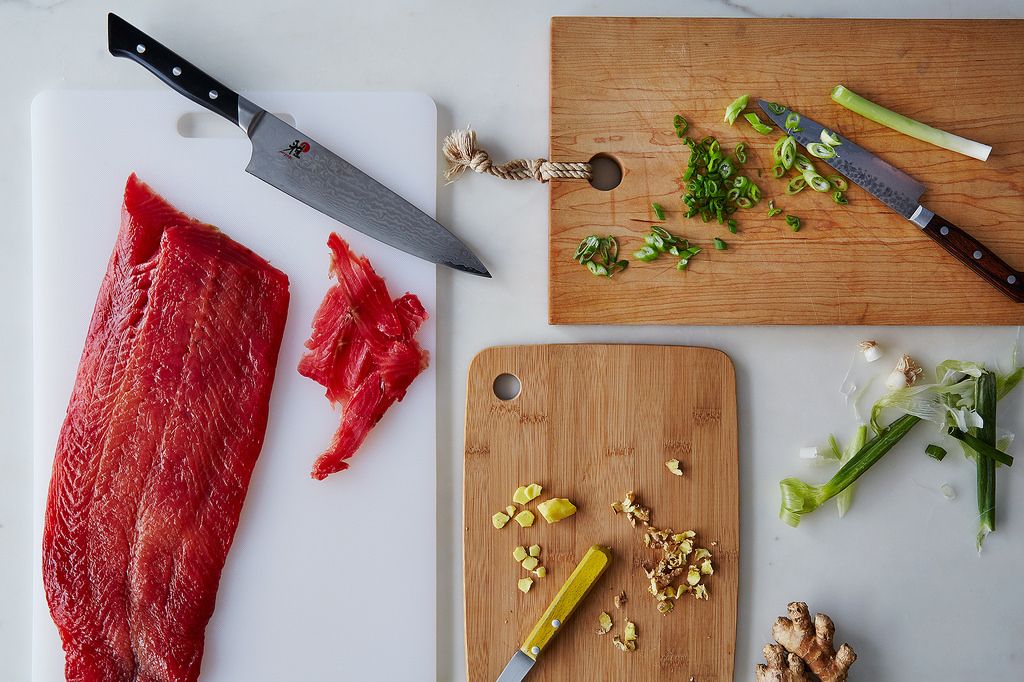While they are necessary kitchen equipment, chopping boards may also serve as a breeding ground for germs if not kept clean and maintained. The significance of caring for and cleaning your chopping boards, the distinctions between wooden and plastic, and recommended practices for prolonging the life of your board will all be covered in this article.
Plastic Vs Wood Chopping Boards
Chopping boards made of wood and plastic need various upkeep and cleaning techniques due to their differences in characteristics. Plastic is non-porous and heat-resistant, whereas wood is porous and may absorb moisture.
The Importance Of Cleaning And Keeping Cutting Boards
- If not maintained and cleaned correctly, chopping boards may serve as a breeding ground for germs.
- Regular upkeep and cleaning may aid in halting the formation and spread of dangerous microorganisms.
- Since they are used to prepare various foods, such as raw meat, vegetables, and fruits, cutting boards are more prone to bacterial development.
- Bacteria on chopping boards may result in foodborne disease.
- For safe food preparation, maintaining and cleaning chopping boards is crucial.
- Frequent cleaning and disinfection may aid in limiting the spread of dangerous pathogens and preventing cross-contamination.
- Separate chopping boards should be used for various kinds of food to prevent cross-contamination.
- Properly storing chopping boards in a dry, cold environment may aid in limiting the development of germs.
- Maintaining a regular cleaning regimen is crucial to keep chopping boards free of dangerous germs.
- Regular cleaning and maintenance may increase the lifespan of your cutting board and reduce the frequency with which it has to be replaced.
Maintenance of Wooden Chopping Boards
When purchasing a chopping board, choosing the proper wood is critical. Hardwoods like cherry, walnut, and maple are excellent options since they are solid and scratch-resistant. Beeswax or food-grade mineral oil may season your board to help preserve the wood and stop it from drying out. Also, it's crucial to prevent too much moisture, which might cause the board to distort and break. If your board is broken, you may repair and refinish it to increase lifespan.
Wood Chopping Boards Cleaning
After each usage, your wood cutting board has to be thoroughly cleaned with soap and water. Bacteria may be killed by disinfecting with vinegar or hydrogen peroxide. Baking soda and water may be used to get rid of tough stains. After cleaning, it's crucial to dry your board to avoid moisture accumulation thoroughly.
Maintenance Of Plastic Chopping Boards
Look for a high-density polyethene plastic cutting board since it is more resilient and less likely to bend or shatter. Avoid subjecting plastic boards to intense heat because they may melt and sustain damage. Also, if your board sustains severe scratches or damage, you should replace it.
Plastic Chopping Boards Cleaning
It's crucial to wash your plastic chopping board with soap and water after each usage. Bacteria may be killed by disinfecting with bleach or a sanitising solution. To get rid of stubborn stains, try using baking soda and water. After cleaning, it's crucial to dry your board, just like wooden boards entirely.
Best Practices For All Chopping Boards
These are some guidelines for using cutting boards:
- To prevent cross-contamination, use different cutting boards for various kinds of food, such as raw meat, vegetables, and fruits.
- Store your cutting board in a cold, dry location to avoid moisture accumulation and bacterial development.
- Maintain a regular cleaning schedule, and always clean your cutting board using water and detergent after use.
- Use vinegar, hydrogen peroxide, bleach, or a sanitising solution to sanitise your cutting board to eliminate microorganisms.
- After cleaning, completely dry your cutting board to avoid moisture accumulation.
- Never subject your cutting board to a dishwasher's high heat and corrosive chemicals.
- Use a cutting mat to preserve the surface of your cutting board and increase its lifespan.
You can ensure secure and sanitary food preparation while also prolonging the life of your chopping board by adhering to these recommended practices.
How To Make Your Chopping Board Last Longer?
The following advice can help your chopping board last longer:
- Avoid using the dishwasher since the hot water and strong chemicals might deform and destroy the board.
- Avoid soaking your cutting board for an extended time or keeping it in standing water, which might cause it to absorb moisture and encourage bacterial development.
- Cover the surface with parchment paper or a cutting mat to prevent cuts and scratches on your cutting board.
- Do not use aggressive cleansers or chemicals that may scratch the surface of your cutting board.
Keeping your chopping board in excellent condition for clean and safe food preparation may assist in prolonging its lifespan.
Maintaining and cleaning your cutting board is crucial to stop developing and spreading dangerous germs. You may increase the lifespan of your board and guarantee secure food preparation by adhering to these best practices and suggestions.


